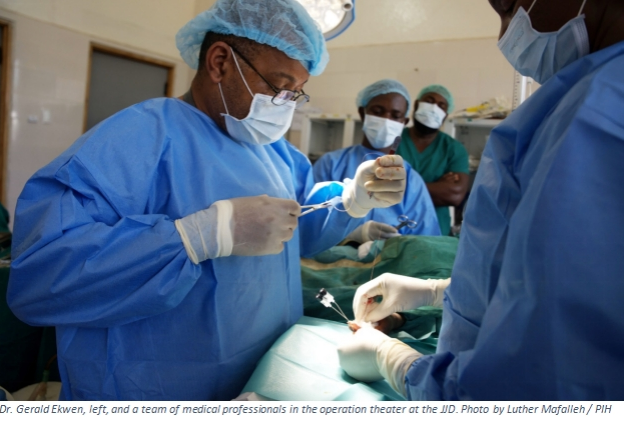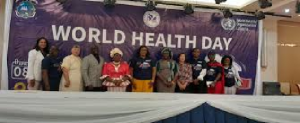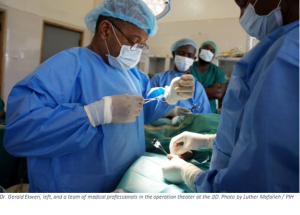PIH on Lifesaving Mission in Rural Liberia

Since 2014, Partners in Health Liberia has accompanied the Maryland County Health Team to perform over 2,000 life-saving surgeries and respond to various forms of emergencies at James Jenkins Dossen (JJD) Memorial Hospital in Maryland County, in the rural southeast of Liberia.
Before 2014, 9 out of 10 people who needed emergency care and lifesaving surgeries like 3-year-old Theresa Smith, were likely to die or suffer severe disability due to the absence of a surgeon in the southeast.
On April 26, 2024, little Theresa Smith (an adopted surname from her guardian) successfully underwent surgery for a burn on her left hand that resulted in contracture –a shortening and hardening of the muscles, tendons, or other tissues.
The burn was allegedly inflicted on Theresa’s hand by her grandmother, who lit a candle and reportedly placed it on her left palm as a punishment for stealing.
After Theresa’s hand was burnt, her grandparents left her in the house unattended and went about their normal activities. A community member who noticed the incident alerted the police.
“When the grandma burned the child’s hand, she left her alone in the house and went to work,” says Cynthia Smith, Deputy Commander of the Criminal Investigation Division of the Liberia National Police assigned at the Pleebo Police Depot in Maryland County.
Officer Smith said that as a result of the abandonment, she assumed guardianship of 3-year-old Theresa and immediately took her to Pleebo Health Center for treatment. After a few days of treatment, Theresa was transferred to JJD Hospital.
As a result of the contracture, her middle and ring fingers were bent in, and her left hand could not open. This condition would have left her hand dysfunctional for the rest of her life. “Without the surgery, she would have had difficulties using her fingers and loss her self-esteem,” says Dr. Gerald Ekwen, PIH’s General Surgeon at the JJD. She was discharged in May.
Little Theresa has undergone two surgeries at the PIH-supported JJD in the last two years. In 2023, she underwent surgery for chronic osteomyelitis (an infection in the bone) and contracture surgery in 2024.
Back in 2023, Theresa’s grandmother had also beaten her and, in the process, fractured one of her legs. She nearly lost her limb due to the development of a severe bone infection from the break. Theresa spent a few days at a local clinic before being transferred to JJD.
At JJD, Dr. Gerald Ekwen, PIH Liberia’s general surgeon, and his team performed a successful sequestrectomy (a surgical procedure involving the removal of dead bone tissue) for chronic osteomyelitis (a serious inflammatory condition that causes swelling of the bone tissue due to an infection) to save Theresa’s leg.
In 2022 and 2023, 631 and 628 surgeries were performed at JJD, respectively. Over the last two years, the lives of over 1,250 people with different life-threatening conditions were saved through life-saving surgeries at JJD; a place where basic medical care used to be non-existent.
According to the World Health Organization bulletin, five billion people worldwide lack access to safe surgeries. The shortage is most severe in low- and middle-income countries, where basic surgical services remain inaccessible for nine out of ten individuals.
PIH has worked hand-in-hand with the Government of Liberia to turn JJD from a run-down county hospital into a hospital of choice; establishing Maryland as a model county for innovative rural health service delivery in Liberia.
Like little Theresa, Nathaniel Doe, and Daniel H. Dennis successfully underwent surgeries for inguinal hernias (a gap in the body tissue that allows the contents inside the stomach to protrude) respectively on June 20th, 2024, at the JJ Dossen Hospital.
Nathaniel is a resident of Pleebo, a father of four children, and an employee of the Cavalla Rubber Corporation (CRC). Nathaniel had been experiencing irregular swelling on his lower stomach for more than two years. He was eventually transferred from the CRC clinic where he was undergoing treatment to JJD.
Daniel is a commercial motorcyclist and a father of three children in Harper, Maryland County. He started experiencing painful swelling in his stomach in 2023.
“I was about to go in the traffic (to start his commercial bike riding for the day) when I started feeling the sharp pain. I couldn’t stand or lay down. The pain was too much, that’s how they (his girlfriend and a friend) rushed me to the JJ Dossen,” Daniel says. Daniel says it was only by the grace of God and his proximity to JJD that he survived.
Looking back
Nine years ago, Maryland County was a medical desert; with little or no health care available. At that time, JJD was a run-down county hospital, with only one general practitioner assigned to it. Patients at the time died of various preventable illnesses like malaria, and broken bones because care was simply not available.
JJD is now classified as a regional referral hospital and is the only facility in the Southeastern region of Liberia where all four core services – surgery, pediatrics, OBGYN, and internal medicine – are staffed by consultant physicians.
Looking Forward
Little Theresa’s hope, like many others, has been restored. She has been saved from disability. For Nathaniel and Daniel, they are hopeful of resuming their respective work and activities upon completion of their treatment.
PIH-L is working with the Maryland County Health Team to establish a hub-and-spoke model to achieve universal health coverage using JJD as a learning laboratory, innovation hub, and referral center for outlying, lower-level facilities across the County.
Since 2014, Partners in Health’s unwavering commitment to rural, remote health care delivery has transformed lives in southeastern Liberia.
In collaboration with the Maryland County Health Team, PIH continues to prioritize programming that tackles the root causes of poverty and disease in rural, under-served populations in southeastern Liberia – believing that taking a rights-based approach to health systems strengthening is key to achieving universal health coverage (UHC).
Meanwhile, the PIH has turned over new incinerators at J.J Dossen Hospital and Pleebo Health Center in Maryland County.
Partners in Health Liberia (PIH-L) has turned over two modern incinerators to the Maryland County Health Team (CHT) to reduce the burden of waste management at the James Jenkins Dossen (JJD) Memorial Hospital and Pleebo Health Center (PHC) in Maryland County.
According to the World Health Organization (WHO), taking measures to ensure the safe management of health care waste can prevent adverse health and environmental impacts including the unintended release of chemical or biological hazards, including drug-resistant microorganisms, into the environment, thus protecting the health of patients, health workers, and the general public.
Speaking at the handover ceremony, in Maryland County, Dr. Sarah Anyango-Morris, PIH’s Deputy Director of Clinical Services thanked the Maryland County Health Team for working hand-in-hand with PIH to strengthen the county’s health system.
“Our aim is to make sure that we build a strong system that will deliver dignified care to all the people that we serve,” Dr. Anyango-Morris said.
This intervention is part of PIH-Liberia’s plan to strengthen health care delivery in Maryland County and build a model for Universal Health Coverage in Liberia.
Maryland County Health Officer, Dr. Seidoh Freeman, described PIH as a part of the Maryland County Health Team and reiterated that the provision of the incinerators is a remarkable project. “Infection prevention and control (IPC) is the bedrock of health care. If you follow the IPC rules, you protect your staff, the patients, and you even protect the community,” Dr. Freeman stated.
Proper control over the medical and general waste of health facilities is paramount to ensuring that communities stay safe and healthy. Dr. Shadrach K. Gono, Pleebo Health Center’s Medical Director, emphasized that the incinerators will play a critical role in infection control in the county. “Waste management for the prevention and control of infection is one of the cardinal aspects of the health care delivery system,” Dr. Gono reckoned.
The incinerators were provided to ensure that patients and staff at all PIH-supported facilities have access to stable electricity, water, sanitation, and hygiene at all times. At PIH-supported facilities, access to stable and reliable electricity, water, sanitation, and hygiene (WASH) are considered non-negotiable.
Since 2014, Partners in Health Liberia (PIH-L) has been working alongside the Government of Liberia through the Ministry of Health and the communities it serves to establish meaningful local partnerships and build delivery systems that improve healthcare access, utilization, and quality for all. PIH prioritizes programming that tackles the root causes of poverty and disease in rural, under-served populations in southeastern Liberia – believing that taking a rights-based approach to health systems strengthening is key to achieving universal health coverage (UHC).
The post PIH on Lifesaving Mission in Rural Liberia appeared first on Global News Network Liberia – Global News Network.



